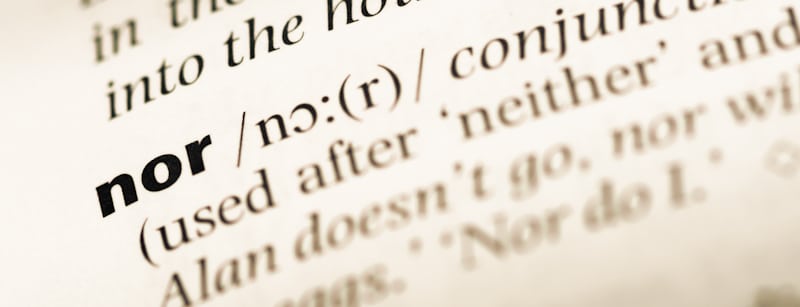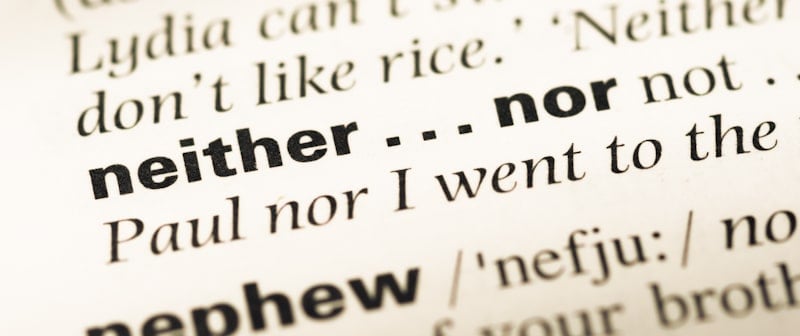Can Read Spanish Perfectly but Stumble When I Speak It
Conjunctions are words used to bring together ii distinct clauses or thoughts. Notwithstanding, using these words to bridge two statements could exist at times confusing – particularly if the connecting word is non as common or straightforward as "but" or "and". In other words, many writers stumble when using the word "nor" to link sentences.
To correctly use "nor" in a sentence, make sure the conjunction introduces a negative chemical element or clause. Though "nor" can be used as a standalone give-and-take, information technology's mostly paired with "neither", an indefinite pronoun. Most importantly, do not apply "either" instead of "neither" as a companion give-and-take for "nor".
Keep reading to learn everything in that location is to know about using "nor" in a sentence (with and without "neither"), some example sentences with "nor" and with both "neither" and "nor" in them, and lots more than.
Nor – Definition

The conjunction "nor" is a negative particle or connective that introduces the 2nd negative clause or chemical element in a sentence – typically following "neither" used in the beginning clause. This human relationship between "neither" and "nor" is the opposite of the word pairing of "either" and "or", with the latter pair having positive connotations. Needless to say, "either" and "nor", or "neither" and "or" cannot be paired together.
How to Properly Utilise "Nor" in a Sentence
As aforementioned, "nor" is used in a sentence post a negative statement, to introduce one more negative chemical element that adds to the start statement.
Beginning a Sentence with "Nor"
It's perfectly fine to begin a sentence with "nor". Those sentences are unremarkably conversational in nature or immediately follow some other sentence.
For example, Tom says "I have never used an iPhone before." To which, Mary could say, "Nor have I."
Starting a sentence with "nor" may sound a bit formal. If you'd like to make the conversation less formal, you may replace "nor" with "neither". In other words, the 2d sentence in the above example could exist, "Neither have I."
The first sentence of a new paragraph usually cannot begin with "nor" since the word is a conjunction. If it's used at the get-go of a sentence, the reader would desire to know the context in which the judgement lies. For instance, the sentence "Nor accept I" sounds incomplete and meaningless if it has no prior sentence to base of operations itself on.
Here are a couple more sentences to explain the point:
"I have described the situation to you over and over again, but you just don't seem to understand. Nor are you willing to endeavour to brand yourself empathise."
If you read only the second sentence starting with "nor" above, it would mean almost cipher.
Using "Neither" and "Nor"
In a sentence, "nor" is commonly paired with "neither". "Neither" is used before "nor" to set up the premise so that "nor" could innovate the adjacent culling or a set of alternatives. This pairing of the two words is called "correlative pairing", which states the information a particular term introduces is related or connected to the data introduced by the other term. The two words could be incorporated when discussing events or when list nouns.
Nevertheless, "nor" is not e'er dependent on or needs "neither" in a sentence. Information technology could at times feature in sentences without "neither" in the initial clause. In such cases, the conjunction is typically a part of the first clause.
Also, "nor" and "neither" are interchangeable. Take a await at the following sentences:
- He cannot fix my telephone and neither/nor can I.
- The cops are unable to accept questions at this signal in time, nor/neither can they make public the name of the suspect.
- My family didn't believe in me, nor/neither did my shut friends.
Though a judgement can have the conjunction "nor" by itself, it isn't the norm. The sentence with only "nor" could, in fact, read a bit unnatural and stiff at times. And since the usage of "nor" without "neither" is not common, information technology may atomic number 82 to some readers assertive y'all framed the sentence wrong.
Some other indicate worth mentioning is both "neither" and "nor" work parallelly. This ways the clauses or phrases they introduce individually should exist of the aforementioned type. In other words, the phrase that follows the ii words should exist a noun or a verb. "Neither" cannot be introducing a noun, and "nor" introducing a verb in the same sentence. For example,
- "She saw neither Jim nor Andre during the excursion." This judgement is correct as both "neither" and "nor" are introducing the proper nouns "Jim" and "Andre" respectively.
- "She neither saw Jim nor spoke to Andre during the excursion." This sentence is too correct as the two correlative words innovate a verb.
- "She neither saw Jim nor Andre during our trip." This sentence is not correct as the word "neither" is followed by a verb, whereas a noun follows "nor".

As mentioned above, "neither" and "nor" introduce clauses that take negative undercurrents, and "either" and "or" have positive connotations. This means breaking the respective pairs and interchanging the words is wrong. In other words, the post-obit sentences are incorrect:
- Todd neither knows the game's rules or tries to know.
- I will either head to the bookstore nor buy groceries.
Also, if the judgement has its tenses mixed, consider the second noun – which is ordinarily the noun afterward "nor". The verb should be adamant based on the tense of the second noun or "nor".
Hither are a couple of sentences for a better understanding of the rule:
- Neither they nor she are great. (Incorrect)
- Neither they nor she is bang-up. (Right)
Using "Nor" in the Same Sentence Twice
Similar mentioned earlier, "nor" is used in a sentence to introduce a secondary clause or element. When it's introducing more than one element, however, the word could exist used more than once in the aforementioned judgement.
Here is a judgement with "nor" mentioned once:
- I similar neither goat milk nor camel milk.
The 2 elements in the sentence are "goat milk" and "camel milk". If the same sentence had more than two elements, information technology would read like this:
- I like neither goat milk nor camel milk nor cow milk. I like but buffalo milk.
Here are a couple more sentences with a couple of mentions of "nor":
- He can neither write nor read, nor is he capable of comprehending such concepts.
- They will not wait for me, nor for you lot, nor for everyone.
As well, the conjunction "nor" could feature more than twice in the same sentence. Here is an example sentence:
- Neither rain, nor snow, nor night gloom, nor oestrus can forbid these courier companies from completing their appointed rounds.
Using "Or" in Place of "Nor"
The conjunction "nor" is used to denote a continuing negative state. The 2 negative items emphasized using the words "neither" and "nor" are function of the same speech. Nonetheless, there are instances when y'all can utilize "or" instead of "nor".
Typically, a sentence that uses "or" doesn't have "neither" in it. The conjunction "neither" is invariably replaced with "not". Hither are a few sentences illustrating the point:
- She is not great on studying scientific discipline or math.
This judgement cannot be framed as, "She is neither slap-up on studying science or math."
Similarly, "He didn't speak clearly or slowly" is grammatically correct. On the other mitt, "He didn't speak clearly nor slowly" is non right.
Example Sentences with the Word "Nor"
The following are sentences that incorporate the word "nor":
- The virus cannot survive in people with strong immunity, nor in nature.
- I do non work for anyone other than Jim, nor do I bid on behalf of anybody else.
- I smiled from the middle, without a curfew nor bounds.
- She wants to get out the town when she is 21, nor does she want to move to the neighboring city.
- The fans do not desire to see her go – nor do I.
- Cooking does not hateful a sacrifice of flavors and taste. Nor do all fast-food items are junk.
- I am almost never up at 5 in the forenoon, nor would I like waking up at 6 am.
- The report was finished on time, nor are there any mistakes in it.
- He did non hear the birds nor the clock.
Here are sentences that employ both "neither" and "nor":
- The trip was neither groovy nor bad – it but was.
- Having said that, neither Tim nor I smoke.
- Neither that behavior nor that argument is helping reduce the tension.
- Neither Mr. Wood nor Mr. Terrence showed up for the meeting held yesterday.
- I can neither offer you advice nor an opinion.
- I neither like pizza nor fancy the cheese.
- She drinks neither beer nor wine.
- Neither Mary nor Tom can speak Spanish.
- Neither dogs nor cats are permitted into the restaurant.
- Tony was a complete wreck, and I am quite sure neither Jacob nor I was whatsoever ameliorate.
- Neither my dad nor my mom went to college.
Conclusion
The conjunction "nor" offers a lot more options to link two or more sentences or create lists. However, in the process of doing so, quite a few skillful writers could finish up making errors atypical of them. It's, therefore, imperative to pay close attention to sentence structure and formation when using "nor" and other conjunctions.
If you are a newbie author or a non-native speaker working on their English language, particularly writing in the language, above are some major pointers for your perusal.
Similar Manufactures:
- How to Properly Use the Word "Nostalgia" in a Sentence
- How to Properly Utilise The Give-and-take "Namely" In A Sentence
- How to Use the Phrase "On the Other Hand" in a Judgement
Source: https://thecontentauthority.com/blog/how-to-use-nor-in-a-sentence

0 Response to "Can Read Spanish Perfectly but Stumble When I Speak It"
Post a Comment